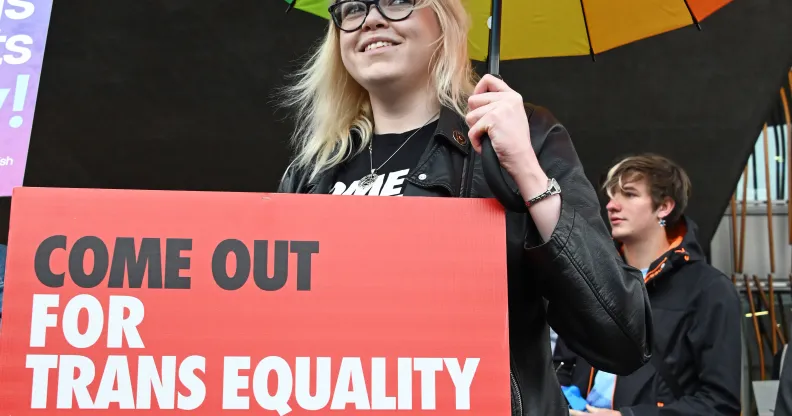SNP women’s officer who called a trans woman a ‘f**king pervy git’ and trans activists an ‘evil cult’ reported to party bosses

A protester demonstrates outside the Scottish Parliament for reform of the Gender Recognition Act (Ken Jack/Getty)
A women’s officer for the Scottish National Party who has been reported to SNP headquarters for anti-trans remarks also called trans rights activism an “evil, dangerous cult” and compared a trans woman to the infamous US serial killer Edmund Kemper.
Marjory Smith, who is the SNP Nairnshire branch’s women’s officer, made anti-trans comments in messages to Emma Roddick, who is standing to be an SNP councillor for Inverness central.
Further anti-trans remarks – including calling a trans woman a “mental fucking pervy git”, trans activists “possessed by an evil dangerous cult”, comparing a trans woman to the infamous US serial killer Edmund Kemper, and referring to trans women as “things” – were uncovered on her social media by the Herald on Sunday.
Smith was writing to Roddick asking her to sign the new SNP Women’s Pledge, which was launched at party conference earlier this month and calls for women to have the right to discuss gender recognition policies.
Roddick declined to sign the pledge, claiming it has transphobic undertones. A number of other SNP members have declined to sign it for similar reasons.
In response, Smith said: “You may believe trans women are women, that is a belief system, but for great many people they are men and always will be.
“They are and will always be nothing but men.”
She then compared those who support trans equality to Jehovah’s Witnesses: “You cannot compel belief from others, as for trying to put it into law that is totalitarian and fascist. At least the Jehovah’s Witnesses just go away when you won’t take a leaflet.”
Roddick told the Herald on Sunday: “It is really worrying that this debate has been allowed to get to the point where a women’s officer within the SNP feels they are able to say things like this, from their position as a women’s officer.
“If we had nipped this in the bud earlier, and highlighted that messages like this were against our code of conduct, instead of hoping it would all go away, we wouldn’t have got to his point of escalation.
“The first message she sent me was asking me to sign the pledge, and made out that this about this isn’t about trans people, its about women. Clearly from how she responded when I declined to sign it, it very much is coming from a place of transphobia.
“A lot of women are being drawn in by these messages, and the idea of the women’s pledge, which on the face of it – to someone not familiar with the wider debate – is going to seem reasonable and sensible.
“These comments are showing that we [the SNP] haven’t, since April when this all really kicked off… We haven’t got on top of the nastier side of things. It shouldn’t be this extreme.
“The types of things that senior SNP figures have been saying in public too, in the media, are not on, and the party should have been on top of that. If this were any other issue, where people were disagreeing publicly with policy you’d be looking at taking action. This is attacking other party members and seems to be OK.
“The leadership are saying this behaviour and these types of comments are OK, by doing nothing.”
Roddick reported Smith’s messages to SNP secretary Angus MacLeod.
The SNP Women’s Pledge group responded to the Herald on Sunday story by calling it a “smear” against Smith who is now “fearful for her personal safety”.
Smith told PinkNews: “I do not believe humans can change sex or be born in the ‘wrong’ body and that the proliferation of these ideas has been detrimental and dangerous to many people. I also believe there is not enough consideration of the consequences for women and children prior to changing protocols.”
SNP point to delays to GRA reform.
SNP sources said the comments are just one example of the transphobia that has proliferated through the party in the wake of the debate around reforming the Gender Recognition Act.
The Scottish government postponed plans to reform the gender recognition act in June, pending further public consultation.
LGBT+ rights groups point to this as evidence of the Scottish government’s commitment to consult widely on any changes to gender recognition laws.
The proposed changes would streamline the way that trans people apply for a gender recognition certificate, which is the mechanism by which trans people can change the legal gender on their birth certificates.
Advocates for the reforms have repeatedly pointed out that this would mean changing legal gender is less expensive, less bureaucratic and less intrusive than the current process, which forces trans people to provide medical evidence and be diagnosed with gender dysphoria.
The second consultation on proposed changes is due to be held soon, with a report called the ‘Equality Impact Assessment’ – which could cover the points raised by the women’s pledge – due to be published alongside the bill.

